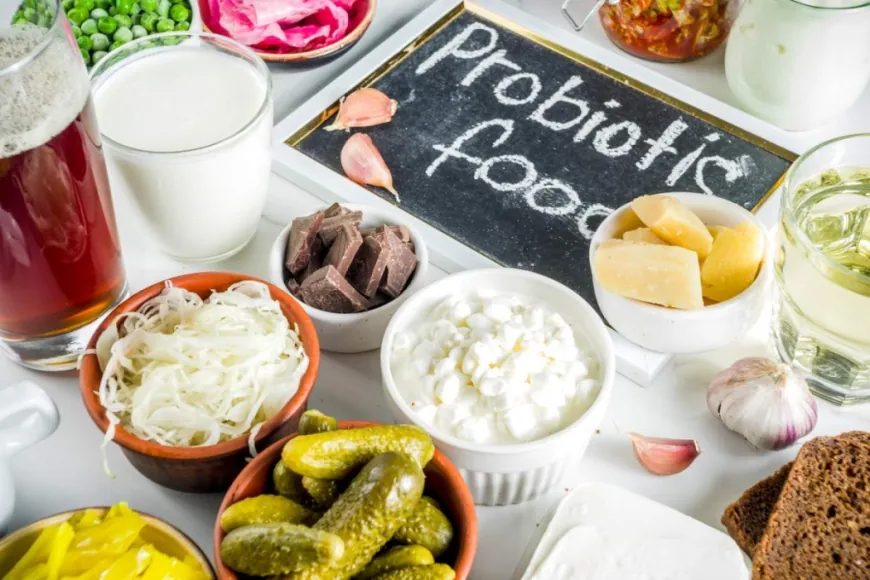Understanding the Benefits of Probiotic Ingredients and Supplements
One of the main reasons why probiotics are so important for our health is because around 70-80% of our immune system is located in our digestive system.

Probiotics are live microorganisms that when consumed in adequate amounts provide health benefits. Specifically, probiotics are live bacteria and yeasts that are good for your gut health. The most common probiotic bacteria found in foods and supplements are Lactobacillus and Bifid bacterium. Probiotics play an important role in maintaining the natural balance of organisms (micro flora) in the intestines and can help facilitate the digestion of food and the absorption of nutrients.
Importance of Probiotic Ingredients for Digestive Health
One of the main reasons why probiotics are so important for our health is because around 70-80% of our immune system is located in our digestive system. When our gut is regularly exposed to good bacteria through the foods we eat and/or supplements we take, it helps our immune system mature and function optimally. Probiotics promote the growth of healthy bacteria in the intestines that protect against harmful pathogenic bacteria, fungi, or viruses that can cause intestinal infections or digestive issues. They also aid in the production of important vitamins and nutrients synthesized by gut bacteria like vitamins K and B12. Conditions like diarrhea, irritable bowel syndrome, inflammatory bowel disease, and urinary tract infections have all been linked to an imbalance of gut microflora which probiotics may help correct.
Food Sources of Probiotic Ingredients
Some high-quality, natural food sources of probiotics include yogurt, kefir, kimchi, kombucha, natto, and tempeh. When choosing dairy yogurt, it's best to opt for Greek or Icelandic varieties as they contain higher counts of beneficial bacteria. The probiotics in fermented foods like kimchi, kombucha and kefir provide a diverse array of probiotic strains with total counts similar to supplements. Fermented vegetables like sauerkraut are another healthy option, especially for those avoiding dairy. It's worthwhile including one or two servings of probiotic-rich foods in your diet on a regular basis to support gut and overall health.
Probiotic Supplements
For people who may not be getting enough Probiotics Ingredients from food sources alone or those seeking supplementary support, high-quality probiotic supplements containing specific researched strains can be very beneficial. When looking for a supplement, it's important to look for several criteria. The supplement should provide multiple probiotic strains in adequate colony-forming units (CFUs) to ensure the live microorganisms survive stomach acid and reach the intestines where they can multiply and have their effects. Renew Life, Align, and Naturelo are some brands that offer high-quality multi-strain probiotic supplements. Capsule or delayed-release tablets are generally better forms than gummies or chewables to protect probiotic potency. Also be sure to store supplements properly as directed to maintain viability.
Role of Probiotic Ingredients
In addition to supporting probiotic intake, it's also important to consume prebiotic fibers that feed the good bacteria in our guts. Prebiotics essentially act as "fertilizer" for probiotics. Research shows that combining prebiotics and probiotics has complementary effects and is the most beneficial strategy for supporting a healthy digestive system and microbiome. Top prebiotic sources include asparagus, garlic, leeks, onions, Jerusalem artichokes, chicory root, dandelion greens, cultivated mushrooms, and seeds like flax, chia and hemp seeds. A high-fiber diet rich in vegetables, fruits, seeds and legumes provides both prebiotics and fiber to promote probiotic proliferation and balanced gut microbiota.
Specific Probiotic Strains and their Benefits
Among the many strains of gut-friendly bacteria, some stand out as especially promising based on research:
- Lactobacillus rhamnosus GG - This popular strain has been shown to manage and prevent diarrhea, reduce risk of respiratory infections, support kidney health and show possible anticancer effects.
- Bifidobacterium lactis BB-12 - Has been linked to managing stress and anxiety levels as well as lowering risk of infections and eczema in infants and children.
- Lactobacillus acidophilus - Aids lactose digestion and produces antimicrobial compounds against harmful bacteria. May benefit vaginal and urinary health.
- Bifidobacterium bifidum - One of the earliest-colonizing and most predominant gut bacteria. Indicated for supporting gut, immune and cognitive health.
- Lactobacillus plantarum - Reduces risk of respiratory, digestive and vaginal infections. Studies show boosting exercise recovery and lowering inflammation in athletes.
The diversity of probiotic strains is what offers the most wide-ranging support to the gut microbiome. Supplements and fermented foods containing multiple strains tend to be more efficacious.
A diet rich in prebiotic fibers alongside probiotic foods and supplements has been associated with reduced risk for many lifestyle-related diseases. Maintaining healthy gut flora is key for overall metabolic, immune and mental wellness. Regular consumption of fermented and live-culture foods along with targeted supplemental strains can optimize our digestive health and balance our inner ecosystem. With so many research-backed benefits, probiotic supporters have easy ways built into their lifestyle for improving gut function and general well-being.
Get more insights on Probiotic Ingredients
For Deeper Insights, Find the Report in the Language that You want
About Author:
Ravina Pandya, Content Writer, has a strong foothold in the market research industry. She specializes in writing well-researched articles from different industries, including food and beverages, information and technology, healthcare, chemical and materials, etc.












